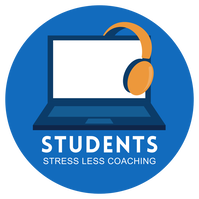Welcome to the blog
The Students Stress Less Coaching blog has a wealth of FREE resources, ranging in topics from executive function skills to exam prep. Enjoy.
 College student failing two classes this semester. College student failing two classes this semester. This could be summarized into three words...fear of failing...but it goes much deeper than this. SIDENOTE: After working one-on-one with hundreds of college students over the years, many of which are high performers in majors such as engineering and other STEM fields, I have noticed this fear of failing that creates enormous amounts of stress and anxiety, as well as this intense tendency to self-criticize. Many of these college students shined academically in high school, did not have to work especially hard, and never felt academic failure. In addition, many of these high performers also never learned how to study for tests, never looked at their mid-semester grades, and never thought about not performing in the top one percent of their class. Everything came easy to them. There was never the chance to practice the act of failing, or to experience the emotions that accompany failing and making mistakes. These and other students who did very well in high school get to college, take hard classes, make mistakes, fail assignments, fail tests, (literally) don't know how to ask for help - never had to do this before, internalize failure, freeze, halt pushing through hard times, self-sabotage, and (some) leave campus. They bail because they convince themselves that failure=incapable. Some students will change majors, engage is coaching and therapy, work directly with campus resources and services, “Take the W”, take a class two times, and come to the self-realization that their career choices may be different that once thought. Let's dissect this hypothesis of why some college students are afraid to make mistakes. It is human nature to fail and feel terrible about it. Who celebrates failing when they feel so yucky with blame, shame, and guilt? However, when the act of making mistakes is often internalized and cognitively distorted, we tell ourselves all kinds of lies to keep from feeling pain associated with failure. Right? Many students are not able to see making mistakes and failing as just that - making- a- mistake. Protective cognitive thinking distorts reality and they resort to catastrophizing, ignoring the positive thinking, black and white thinking, and other faulty thinking patterns. In the executive functioning world, we call this inability to think flexibly cognitive flexibility and when a student cannot apply cognitive flexibility in situations where mistakes are made and failure is experienced, all kinds of emotions result. Experiencing failure (i.e.: failing two tests in the same class one semester and having to "Take a W"), accepting failure as a human experience, learning from the failure, and trying other options so as to foster "bounce back" can go one of two ways: 1. failing and working through the feelings attached with the experience, 2. failing and freezing with negative internalization Making mistakes and failing in college is a true test of mental resilience and mental strength. Students that are high performing, who struggle with perfectionistic thinking, and who have never practiced working through the feelings attached to failing often struggle emotionally in college when they do not know what to do with these feelings. How do students build the mental resilience skill so that making mistakes becomes more acceptable, and self-compassion is more practiced? They fail. They feel. They accept. They love. They encourage. They repeat. Read more about mental resilience in Module #5 of Everything But Books - 8 Necessary Skills to SurTHRIVE Freshman Year of College. Visit our website.
0 Comments
|
|
